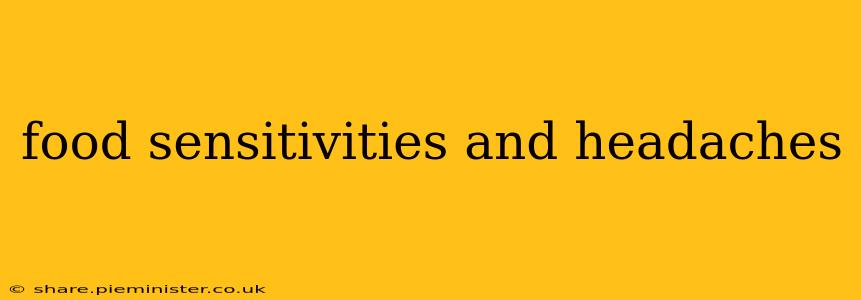Headaches are a common ailment, affecting millions worldwide. While stress and lack of sleep are frequent culprits, many people find their headaches linked to the food they consume. Understanding the connection between food sensitivities and headaches is crucial for effective management and relief. This comprehensive guide explores this relationship, offering insights into common triggers, diagnostic approaches, and management strategies.
What are Food Sensitivities?
Food sensitivities, also known as food intolerances, represent a negative reaction to a particular food or food additive. Unlike food allergies, which involve the immune system triggering a rapid and potentially life-threatening reaction, food sensitivities manifest more subtly and often over a longer period. Symptoms can range from digestive issues (bloating, gas, diarrhea) to skin problems (rashes, hives) and, importantly for this discussion, headaches.
How Do Food Sensitivities Cause Headaches?
The mechanisms linking food sensitivities to headaches are complex and not fully understood. However, several pathways are implicated:
-
Inflammation: Certain foods can trigger inflammation throughout the body, including the brain and its surrounding blood vessels. This inflammation can lead to headaches, particularly migraines. Common inflammatory triggers include processed foods, gluten, dairy, and artificial sweeteners.
-
Histamine Release: Some foods are high in histamine, a compound that plays a role in allergic reactions. Excess histamine can lead to blood vessel dilation and inflammation, contributing to headaches. Foods high in histamine include aged cheeses, fermented foods, and certain fish.
-
Gut-Brain Connection: The gut and brain are intricately connected through the vagus nerve. Food sensitivities can disrupt gut health, leading to inflammation and altered gut microbiota. This imbalance can influence brain function and trigger headaches.
-
Additive Effects: Food additives, such as preservatives, artificial colors, and flavor enhancers, can also trigger headaches in sensitive individuals. These additives may exacerbate underlying inflammation or directly affect neurotransmitters in the brain.
What Foods Commonly Trigger Headaches?
Many foods have been linked to headaches in susceptible individuals. These include:
-
Gluten: Found in wheat, barley, and rye, gluten can trigger headaches in those with celiac disease or non-celiac gluten sensitivity.
-
Dairy: Lactose intolerance or a sensitivity to casein (a milk protein) can lead to headaches.
-
Processed Foods: High in sodium, artificial additives, and unhealthy fats, these foods often contribute to inflammation and headaches.
-
Caffeine: While caffeine can relieve some headaches, withdrawal can trigger severe headaches in regular consumers.
-
Aged Cheeses: High in histamine, they can exacerbate headaches in sensitive individuals.
-
Chocolate: Contains tyramine, a compound that can cause blood vessels to constrict and dilate, contributing to headaches.
-
Alcohol: Dehydration and the release of various chemicals during alcohol metabolism can lead to headaches.
-
Artificial Sweeteners: Aspartame and other artificial sweeteners have been reported to trigger headaches in some people.
Can I Test for Food Sensitivities?
Several methods can help identify food sensitivities:
-
Elimination Diet: Systematically removing suspected trigger foods from your diet for a period, then reintroducing them one at a time to observe reactions. This method requires careful tracking and patience.
-
Food Allergy/Intolerance Testing: Various tests, including blood tests and skin prick tests, can assess for food allergies and intolerances. However, the reliability of these tests is debated. Discuss these options with your doctor.
-
Keeping a Food Diary: Meticulously documenting your food intake and headache frequency can help identify patterns and potential triggers.
How Can I Manage Headaches Related to Food Sensitivities?
Effective management involves several strategies:
-
Identify and Eliminate Triggers: Once you've identified potential trigger foods, consistently avoid them.
-
Maintain a Healthy Diet: Focus on whole, unprocessed foods, including fruits, vegetables, lean proteins, and whole grains.
-
Stay Hydrated: Dehydration can worsen headaches. Drink plenty of water throughout the day.
-
Manage Stress: Stress is a significant headache trigger. Practice stress-reducing techniques like yoga, meditation, or deep breathing exercises.
-
Get Enough Sleep: Aim for 7-8 hours of quality sleep each night.
What if I Suspect Food Sensitivities are Causing My Headaches?
If you suspect a link between your headaches and food sensitivities, consult a healthcare professional. They can help you accurately diagnose the issue, develop a tailored management plan, and rule out other potential causes of your headaches. They may also refer you to a registered dietitian for personalized dietary guidance.
Can Certain Medications Help?
While medication can treat headaches, it doesn't address the underlying cause—the food sensitivity. Your doctor may prescribe medication to manage headache symptoms, but addressing the dietary triggers is essential for long-term relief.
This information is for educational purposes only and should not be considered medical advice. Always consult a healthcare professional before making any significant changes to your diet or treatment plan.
